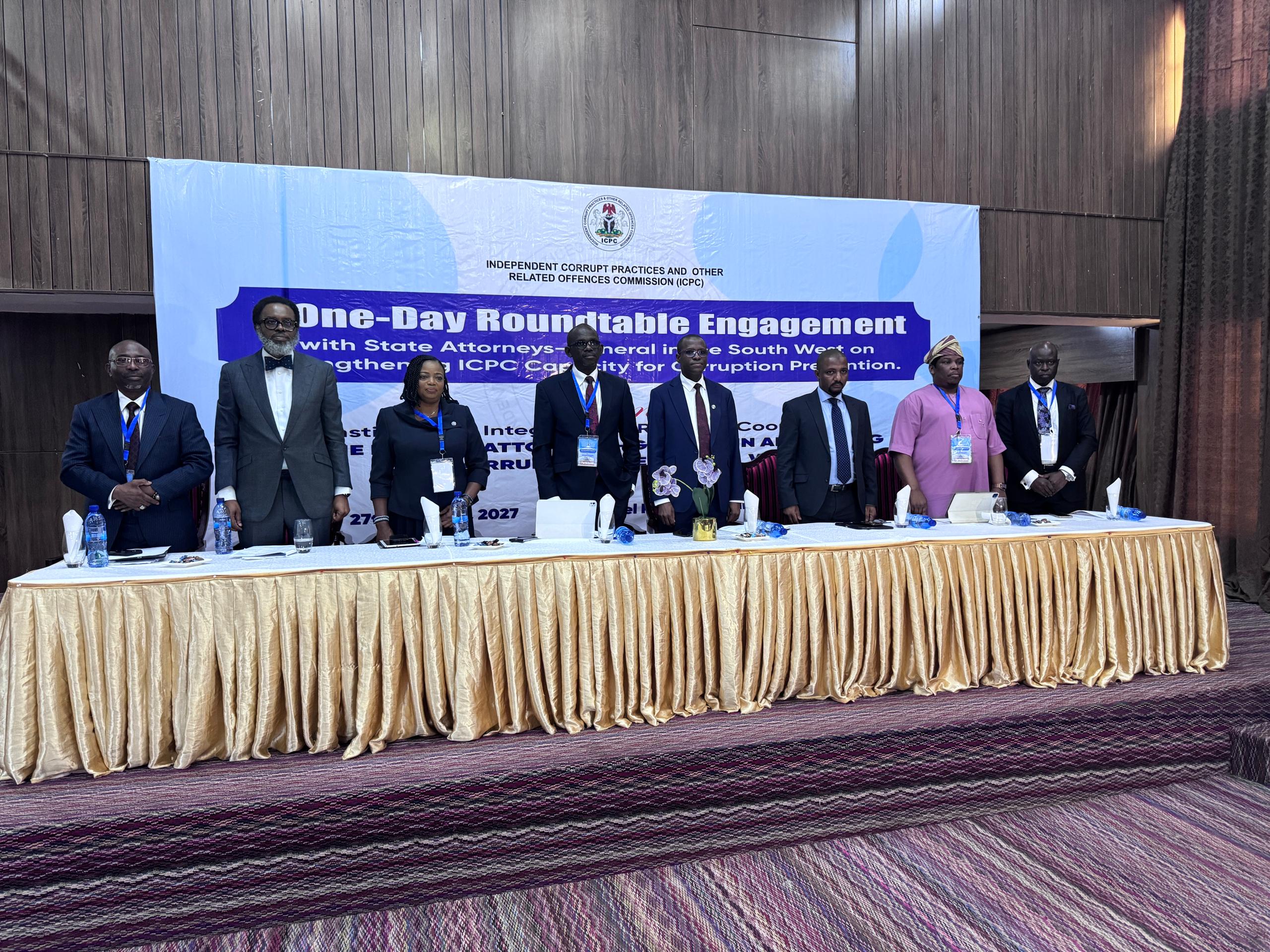The Independent Corrupt Practices and Other Related Offences Commission (ICPC) and State Attorneys-General from the South-West geo-political zone have resolved to deepen collaboration in the fight against corruption by establishing a formal partnership that will enhance preventive measures, strengthen public enlightenment, and improve institutional accountability across states.
This resolution emerged from a one-day roundtable engagement held in Akure, Ondo State, where participants reached a landmark agreement to institutionalize cooperation between the Commission and State Ministries of Justice. The meeting, which had the theme “Institutional Integrity and Regional Cooperation: The Role of Attorneys-General in Advancing a Corruption-Free South-West,” brought together Attorneys-General from Lagos, Ogun, Oyo, Osun, Ondo, and Ekiti States, alongside ICPC directors, legislators, judicial representatives, and other stakeholders.
Declaring the event open, the Chairman of the Code of Conduct Bureau (CCB), Dr. Abdullahi Usman Bello, commended ICPC’s leadership for promoting meaningful dialogue between federal and state institutions in pursuit of transparent governance.
The keynote address, delivered by former Lagos State Attorney-General and Commissioner for Justice, Mr. Moyosore Onigbanjo, SAN, underscored the delicate balance between politics and the law, emphasizing the independence of the Attorney-General’s office as vital to preserving justice and accountability.
Coordinating the technical session, ICPC Chairman, Dr. Musa Adamu Aliyu, SAN, highlighted the Commission’s commitment to strengthening sub-national governance through collaborative frameworks that prioritize prevention over punishment.
He noted that effective anti-corruption systems require coordination, trust, and sustained engagement between federal and state actors.
At the end of deliberations, participants adopted a series of resolutions aimed at institutional reform and deeper cooperation. They agreed to develop a formal Memorandum of Understanding (MoU) between the ICPC and South-West States, which will define roles, responsibilities, and communication channels for joint anti-corruption initiatives.
The MoU is expected to provide a structured platform for cooperation in enforcement, prevention, and public enlightenment strategies within the zone.
Participants also emphasized the need to shift emphasis from enforcement and prosecution toward sensitization and preventive strategies, arguing that early education, awareness, and ethical reorientation can produce longer-lasting results than punitive measures alone.
They reaffirmed the importance of continuous support and partnership between the ICPC, state governments, and local authorities, especially in implementing the Commission’s Accountability and Corruption Prevention Programme for Local Governments (ACPP-LG).
Furthermore, the forum advised that investigation letters to public officers should contain sufficient details to enable proper response and preparation by both the recipients and the relevant state authorities.
To promote efficiency and transparency, participants recommended that the ICPC strengthen its state offices to handle investigations locally, thereby reducing the need for officials to travel to Abuja and ensuring better coordination of inquiries.
The roundtable also urged the ICPC to intensify its sensitization campaigns in secondary schools and universities, focusing on instilling the core national values of honesty, responsibility, and integrity among young Nigerians.
Finally, the Attorneys-General and other leaders were encouraged to lead by example, demonstrating the ethical conduct and accountability they expect from others.
The communiqué containing these resolutions was signed by the ICPC Chairman, Dr. Musa Adamu Aliyu, SAN, alongside the Attorneys-General of Lagos, Ogun, Oyo, Osun, Ekiti, and Ondo States, signalling a unified front to entrench integrity, strengthen justice systems, and decentralize anti-corruption efforts in Nigeria’s South-West region.
Described by participants as a bold and timely step, the roundtable reaffirmed that the fight against corruption must extend beyond federal boundaries to include state and local institutions working in synergy toward a corruption-free Nigeria.


